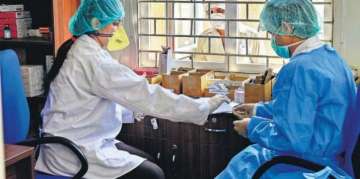Doctors Day: Violence against medical professionals, our healthcare system and possible solution
The role of a doctor in our day-to-day lives has only grown in significance, especially now that people are turning to doctors and other frontline healthcare professionals for safety during COVID outbreaks.

In times of pain and suffering, we have always been reliant on one profession: doctors. While doctors are vital assets regardless of location, for a long time, Indian doctors have been regarded as one of the best. Our doctors have left no stone unturned when it comes to reinventing the idea of what "excellent healthcare" should look like, whether it's addressing basic problems like iodine shortage or conducting complex surgery that takes longer.
The role of a doctor in our day-to-day lives has only grown in significance, especially now that people are turning to doctors and other frontline healthcare professionals for safety during COVID outbreaks. They are our true heroes in these trying times, putting their own lives on the line with unselfish resolve for the purpose of saving lives.
Sadly, the pandemic has not only revealed true brave-hearted doctors but has also revealed the abuse and violence against doctors in India. Violent attacks against doctors have been occurring in Indian hospitals for a long time, and the pandemic shone a bright light on it. According to a news report by a popular news portal, the family of a Covid patient who had died, reportedly owing to an oxygen shortage, brutally beat, kicked, and pummelling a doctor at a coronavirus facility in Assam's Hojai, about 140 kilometres from Guwahati, a few days ago. The same doctor was also attacked by locals.
To combat violence against doctors, it must first be recognised as a significant public health issue. The Indian state has the main moral duty and accountability for ensuring the dignity of doctors and patients. The best lasting approach to guarantee that strain on both doctors and patients is relieved, is to fundamentally reform and improve the public health system by increasing the health budget for the country. An increased spending would lead to an increased doctor-patient ratio and better facilities (currently, the doctor-population ratio in India is 1:1456 against the WHO recommendation of 1:1000). When there is an efficient healthcare system to deliver quality healthcare, violence against doctors would significantly reduce.
That said, India spends a meagre 3.6 percent of its GDP on healthcare. This is way below the average of 7.6 percent for OECD and various BRICS countries. A significant proportion of our population die because of lack of facilities and treatment. The doctors often have to face the brunt of these deaths from the respective family members in the form of violence.
The challenges faced by our healthcare system are unique and diverse. One on hand, there is tremendous possibility of growth for the healthcare system in the future. The Indian health sector is projected to increase three-fold to INR 8.6 trillion (US$ 133.44 billion) by 2022. Also, India has emerged as a popular destination for medical travel. The industry now has some of the best world-class medical equipment, infrastructure and doctors. India presently has around 18% of the global medical tourism market. The government is attempting to grow the industry by making it simpler for tourists to come for medical reasons. After all, India does have state-of-the-art medical facilities, reputable healthcare experts, high-quality nursing care, and traditional medicinal treatments.
But, on the other hand, despite the promise and potential of the healthcare industry, our healthcare professionals are facing an increasing trend of aggression and it’s turning out to be a new epidemic. Almost every week, there are incidences of violence against doctors. It is the duty of the governing authorities to strengthen the doctor-patient relationship and adhere to certain measures to prevent or minimize violence against doctors.
The life of doctor isn’t an easy one. It is entwined with critical decisions, no assurance of a family life and tough work schedules. Even though doctors may be experts in their profession but that doesn’t always warrant positive outcomes. Several external factors also play an important role in the way doctors perform efficiently.
It is time that this trend of violence and aggression towards doctors is reversed and healthcare providers are provided with the protection they need. The government needs to take measures to provide hospitals and other care facilities a safer environment for all through increased allocation of the GDP in health care, better infrastructure, awareness and appropriate laws.
-- Written by Nikkhil K Masurkar, Executive Director, ENTOD Pharmaceuticals